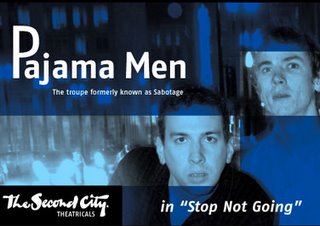 Maggie says:
Maggie says:One of the books I most enjoyed reading over the holidays was
Prep, the story of a middle-class, Midwestern girl catapulted into East Coast high society at boarding school.
I felt so close to the protagonist, a girl handicapped by her own insecurities in a world where you don't
talk about money, you just
have it. Back in December, I saw Prep on the NY Times Best Books of 2005 list, and wrote
this:
Is it lame or downright brilliant that a single sentence in an excerpt makes me want to buy this one for myself? In a classic, "outsider goes east/prep to make her way in a supposedly smarter world" story, how's this: "I'd pretended it was about academics, but it never had been. . . . I imagined that if I left South Bend, I would meet a melancholy, athletic boy who liked to read as much as I did and on overcast Sundays we would take walks together wearing wool sweaters.'' Isn't it funny, our perceptions of how things will be (like, you know, going to college in Boston instead of your home state of North Carolina...) versus how they actually are?
My instincts were right-on, because the whole time I was reading this, I kept seeing myself in Lee. Or maybe, what I saw most was who I might have become had my parents not moved us out of a culture that made me so nervous and unsure of myself I undoubtedly would have turned out differently.
Lee was a scholarship kid at "the Ault School," an ultra-rich boarding school in New England. I
wasn't a scholarship kid at St. Andrews, a fairly expensive private school in Newport News, Va, but I was only there because my parents were spending every dime they made to pay the tuition instead of sending my siblings and I to the notoriously bad public schools in town. By the time I "graduated" from fifth grade, the next step was Hampton Roads Academy, where the privileged went without thinking twice. The tuition for one year of sixth grade at HRA was more than the tuition of my brother, sister, and I at St. Andrews
combined. It wasn't going to happen. So we moved back to NC, where my parents are from, and started again in an area with
great public schools and lots to offer. That move changed my life.
It's a peculiar situation to be surrounded by money but not have it yourself, and if you haven't been in it you'll never really know what I mean. Don't get me wrong - I wouldn't have changed my family or our lifestyle for anything - but living in Virginia, I was always keenly aware of how different my friends' homes and lives were than mine. Their homes were large, their vacations took them across the country instead of the state, and they did foreign things like skiing that seemed absolutely terrifying to me. A close friend actually got mad at me when I suggested that she was "rich." "We're not rich," she said. "We're just
well-off." This friend had grapefruit spoons in her kitchen, which I was convinced were the epitomy of class and elegance. One day, I told myself, I'd have grapefruit spoons in my house. The thing is, I still can't bring myself to buy them, although they're not expensive and are readily available. To me, grapefruit spoons will always represent privilege. And so I don't think I'll
ever own them; the symbolism would be too much to bear.
Lee knows this, too. She tells us that in college she was standing in a drugstore aisle smelling the shampoo that all the rich Ault girls would use. "This is the best shampoo in the world," she tells her friend. "So buy it," her friend answers back. But she can't. I know why.
Also funny are the differences between homes and houses. My family, in my small little house
not overlooking the James River, was the one everyone loved. Sleepovers were at my house; class trips went to my grandparents' farm to pick pumpkins for Halloween instead of other classmates' family estates in Charleston or Richmond. My house equaled warmth, the only thing missing in some other girls' families.
After we moved and I had the luxury of blending into public school life (which is every adolescent girl's desire... "
just don't let me be different..."), I felt strange visiting my old friends at Hampton Roads Academy and their country club. They were steadily growing into lifestyles that I was beginning to consciously dislike. My friends were my
friends, as wonderful as always, but it was
their new friends who I hated,
their country club that set my nerves to a frazzle... Only visiting them did I feel
less than I did in NC, and over time I realized how lucky I'd been, how when my parents had broken my heart by announcing that we were moving, they were truly allowing me to be
me in a way I never could have been in Virginia. Had I been forced to grow up in that culture, with that difference (all the girls were 5'2 and blond, and
everyone had an eating disorder), I would have never found my voice. I would have worried endlessly about what clothes I had (at least at St. Andrews we wore uniforms); what car I drove; that my parents weren't
members of the country club, much less have an account where I could charge overpriced lunches after lounging by the pool all day; what countries I'd been to (none); and how I would never under any circumstances be 5'2 and 110 pounds.
Prep
gets this. The book nails what it is to be different and to be mortified by the differences in a time when you just want to blend in. It shows a girl crushed by her insecurities to the point where she's only barely functioning. (I can remember sitting at the pool with my friends and overhearing a guy friend of theirs snidely say, "Your friend is
fat." And folks, I wasn't fat at all, I just wasn't anorexic!) It shows a girl believing she's a vibrant, smart girl in her head but acting like anything but whenever anyone else is around.
It might sound crazy (and Marjorie has told me she doesn't believe this), but I could have
been Lee. I could have
been her. I could have been too shy to talk all through high school instead of doing some of the pretty amazing things I ended up doing at my great public school in NC. High school in NC became all about finding my voice, realizing what made me different, and really treasuring that early on. I got through the annoying "trying to fit in" phase really early in middle school, because I was able to see relatively quickly that none of that mattered. But had I been a scholarship kid at HRA, I would have been crushed under the weight of trying to fit in, even though I never, ever would have been able to.
So for being me, I thank my parents and their decision to get me out of a money-soaked world that would never be mine. I'm not a private-school girl at heart. I never was. It just took me getting out of there to realize that.
Meet Prep author Curtis Sittenfeld (she's only 29!)
BOOKWORKS
Sunday, February 5
3:00 p.m.
More info
here.
 Mikaela says:
Mikaela says:





